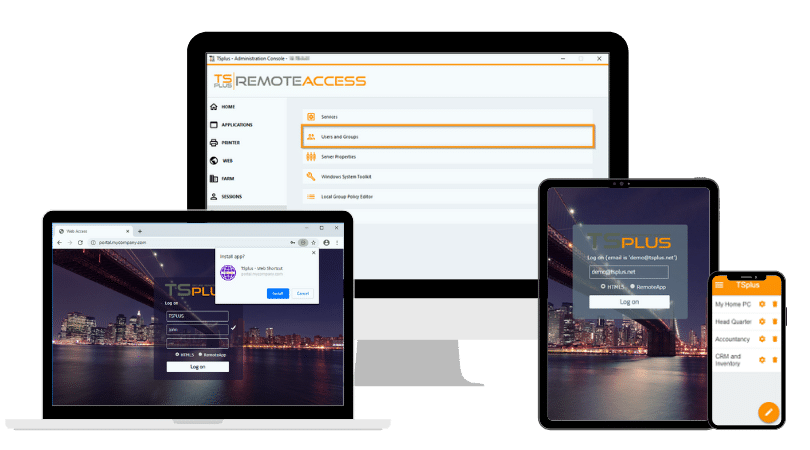)
)
Command Line Tools for Remote Restart
Overview
Command line interfaces (CLI) are essential tools for IT professionals managing remote computers. They offer precision, scalability, and direct control over systems, ideal for executing remote operations like restarts. CLI tools are particularly valued for their ability to be scripted and automated, which enhances the efficiency of managing large networks of computers.
Using Windows CMD and PowerShell
CMD
The Command Prompt in Windows is a powerful tool to manage remote systems:
- Initiating Remote Restart: Open Command Prompt with administrative privileges and execute the command
shutdown /r /m \\computername /t 0to perform an immediate restart of a remote computer identified by its network name. - Scheduling Restart: Modify the time parameter
/tto delay the restart, allowing time for any essential operations or to notify users. For example,shutdown /r /m \\computername /t 60will schedule the restart in 60 seconds.
PowerShell
PowerShell offers a more sophisticated approach with extensive scripting capabilities:
- Standard Restart: Open PowerShell with administrative rights and use
Restart-Computer -ComputerName computername -Forceto forcefully restart a remote system without waiting for applications to close. - Asynchronous Operations: Append
-AsJobto execute the restart in the background, allowing the script to proceed without waiting for the restart to complete.
Using SSH for Linux
SSH Commands
Secure Shell (SSH) is the standard for secure remote management of Linux systems:
- Connection: Use
ssh username@computernameto establish a secure connection to the remote Linux system. - Executing Restart: Run
sudo rebootafter authentication to initiate a restart. This requires administrative rights on the system and might prompt for a password.
Best Practices and Security
Security Measures
- Authentication: Implement strong authentication mechanisms such as key-based SSH authentication to secure access to remote systems.
- Updates: Keep all systems and remote access tools updated to mitigate vulnerabilities that could be exploited remotely.
Maintenance Protocols
- Regular Audits: Regularly audit access logs and session records to ensure that only authorized actions are being taken on remote systems.
- Compliance: Ensure all remote operations comply with organizational security policies and standards.
By leveraging these command line tools and following best practices, IT professionals can efficiently manage remote restarts across diverse operating systems, enhancing the operational resilience and security of their network environments.
Remote Desktop Services
Introduction
Remote Desktop Protocol (RDP) is a powerful tool that allows IT professionals to take full graphical control of a remote system. This capability is vital for conducting a variety of administrative tasks, such as software installations, updates, and system restarts, without the need for physical presence at the machine's location.
Restarting via RDP
Connection Setup
- Initiate the Connection: Start by opening the Remote Desktop Connection client on your machine. Enter the remote system's network name or IP address in the 'Computer' field and click 'Connect'.
- Authentication: Enter your credentials when prompted. Ensure that these credentials have administrative rights on the remote system to perform a restart.
Executing a Restart
- Access the Start Menu: Once connected and authenticated, access the Start menu on the remote system, either by clicking the Start button or pressing the Windows key on your keyboard.
- Navigate to Power Options: In the Start menu, find and click on 'Power options'. Here, you will see options such as 'Sleep', 'Shut down', and 'Restart'.
- Choose Restart: Select 'Restart' to initiate the reboot process. Confirm any prompts that appear to avoid accidental system shutdowns.
Security Enhancements
Implement Network Level Authentication (NLA)
- Purpose: NLA adds a layer of authentication before the remote session is established, enhancing security by protecting against unauthorized access.
- Configuration: Ensure NLA is enabled on both the client and the host machine. This is typically managed within the Remote Desktop settings under the 'Security' tab.
Firewall and VPN Usage
- Firewall Configuration: Restrict RDP access at the firewall level to allow connections only from known IP addresses. This limits potential exposure to attacks.
- VPN Connections: Employ a Virtual Private Network (VPN) to encrypt the RDP traffic between the local and remote machine. This is crucial when managing systems over the internet or unsecured networks.
By optimizing these RDP settings and adhering to security best practices, IT administrators can ensure a secure and efficient remote management experience, minimizing the risks associated with remote desktop access.
Leveraging Third-Party Tools
Overview
Third-party remote management tools are invaluable for IT professionals overseeing extensive networks. These tools surpass basic native features by delivering advanced functionality and a user-friendly experience, which is crucial for effectively managing multiple machines or complex configurations in distributed environments.
Features of Modern Tools
Comprehensive Monitoring and Management Dashboards
- Centralized Control: Modern tools offer dashboards that provide a centralized view of all connected systems, allowing administrators to monitor health, performance, and security statuses in real-time.
- Automation and Scripting: These dashboards often support scripting and automation, which streamline routine tasks across multiple systems, enhancing efficiency and reducing human error.
Options for Mass Remote Restarts and Scheduled Restarts
- Bulk Operations: Administrators can execute restarts on multiple machines simultaneously with just a few clicks, which is essential for applying updates or configurations uniformly.
- Scheduling: Tools often feature scheduling capabilities, allowing IT teams to plan restarts during off-hours to minimize disruption to business operations.
Enhanced Security Features
- End-to-End Encryption: To secure communication between the administrator's console and client machines, third-party tools utilize robust encryption protocols, ensuring that all transmissions are protected against interception.
- Multi-Factor Authentication (MFA): Additional layers of security are common, with MFA requiring users to authenticate with more than one method of verification, thereby significantly reducing the risk of unauthorized access.
By integrating these sophisticated third-party tools, IT departments can achieve a higher level of operational control and security, making remote system management both effective and reliable. These tools are designed to meet the demands of modern IT environments where rapid response and comprehensive oversight are paramount.
TSplus Solution
TSplus software provides robust and secure tools designed for comprehensive remote system management. Our solution supports seamless remote operations, ensuring optimal performance and reliability for IT infrastructures.
For more details on how TSplus can streamline your remote management tasks, visit our website at TSplus.net.
Conclusion
Mastering the techniques for remotely restarting computers is essential for today's IT professionals, given the expansive and intricate nature of modern networks. By employing a blend of command line operations, remote desktop services, and sophisticated third-party tools, administrators can ensure seamless, secure, and efficient management of remote systems. These capabilities not only facilitate crucial maintenance and updates but also uphold robust security standards crucial for organizational IT infrastructure.

TSplus Remote Access Free Trial
Ultimate Citrix/RDS alternative for desktop/app access. Secure, cost-effective, on-premises/cloud














)
)
)